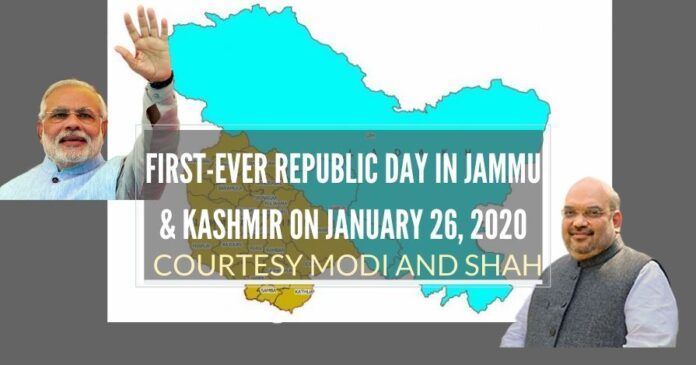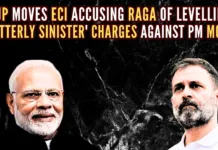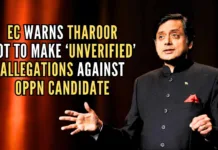
For the first time in 69 years that the people of Jammu, Kashmir, and Ladakh would celebrate January 26 as Republic Day in the real sense of the term.
No one could ever imagine that the people of Jammu, Kashmir, and Ladakh would one day celebrate Republic Day in the real sense of the term. But it has happened. Prime Minister Narendra Modi and Home Minister Amit Shah made it possible. The Indian Parliament, the supreme lawmaking body of the country, exercised its power on August 5 and 6, 2019 and fulfilled the 71-year-old dream of the nation in general and people of Jammu and Ladakh in particular. Both the PM and the HM and the Indian Parliament rejected with contempt the politics of separatism, based on religious fanaticism, in Kashmir and scrapped discriminatory Article 35A, divisive Article 370 and Jammu & Kashmir Constitution of 1957 and discarded the separate Jammu & Kashmir’s red and white flag.
The Preamble of the Indian Constitution clearly vouches for equality of status to all Indian citizens and bar the legislature and the executive from making unjust, invidious and humiliating distinctions between Indian citizens on whatever ground.
Article 35A, Article 370, Jammu & Kashmir Constitution and the red and white flag had created an impression across the globe that Jammu & Kashmir was not an integral part of India. These had also made the Kashmiri Muslims and their supporters outside Kashmir believe that Jammu & Kashmir was a sovereign state and that it was a republic within the Indian Republic with New Delhi having no power whatsoever to do anything in the state. On Thursday (January 23, 2020), the Narendra Modi government told the Supreme Court of India in unambiguous terms that Jammu & Kashmir was a part of the Union of India and not a sovereign entity and that the abrogation of Article 370 irreversible. In effect, it told the apex court that the Parliament had integrated Jammu & Kashmir into India and it had to uphold the new regime that also created out of the State of Jammu & Kashmir two Union Territories, UT of Jammu & Kashmir and UT of Ladakh.
“The abrogation of the provisions of Article 370, which granted special status to erstwhile Jammu & Kashmir, has now become a ‘fait accompli’ leaving a sole option to accept the change,” the Government of India told the Supreme Court while opposing the pleas against the abrogation of Article 370. The stand taken by the Union Government was rational, national and commendable as it meant real business.
Obviously, this stand of the Union Government rattled the political elite in Kashmir and the entire secular class across India, which considered, and continue to consider, Article 370 part of the basic structure of the Indian Constitution. It’s a different story that the political elite in Kashmir and the Indian secularists have little or no respect for the preamble of the Indian Constitution. The Preamble of the Indian Constitution clearly vouches for equality of status to all Indian citizens and bar the legislature and the executive from making unjust, invidious and humiliating distinctions between Indian citizens on whatever ground.
The Preamble of the Constitution reads like this: “We the people of India, having solemnly resolved to constitute India into a Sovereign Socialist Secular Democratic Republic and to secure to all its citizens: Justice, social, economic and political; Liberty of thought, expression, belief, faith and worship; and Equality of status and opportunity”.
It must remain a matter of grave concern that the Congress party has dismissed the moves of the Narendra Modi Government on bringing “uniformity” in the country as “threats to democracy”. Only on January 23, the Congress, among other things, said: “Besides fear, intolerance, increase in instances of vendetta and bringing in uniformity are the factors leading to fall in India’s position on democracy index”. The Congress and similar other outfits, including the CPI, the CPIM, the NCP, the RJD, the TMC, the JDS, the SP, to mention only a few, alone can have the temerity to say what they said, and continue to say, about the otherwise nation-making and bold endeavours of the Prime Minister and the Home Minister. The Prime Minister and the Home Minister deserve bouquets for their path-breaking and nation-making measures, but the irresponsible Opposition has been throwing stones on them in their desperate bid to appease the followers of one particular religion.
Children of employees in the industry coming from outside will have access to educational facilities and professional education and their spouses will have equal opportunity to explore job avenues.
Anyway, what happened in Jammu & Kashmir and Ladakh after August 6, 2019, nay after October 31, 2019? All the 800 Central Laws were made applicable to both the Union Territories. The result was that Jammu, Kashmir, and Ladakh brought at par with all the states of the Union and all the Union Territories. Not just this, 153 Jammu & Kashmir Laws as passed by the Governments of Sheikh Abdullah and his son, Farooq Abdullah, and grandson, Omar Abdullah; Mufti Mohammad Sayeed and his daughter Mehbooba Mufti; and Ghulam Nabi Azad etc were completely withdrawn. One of the laws that were withdrawn was the atrocious Jammu & Kashmir Resettlement Act of 1982. It was also called the “Black Bill”. It provided for the resettlement of those Muslims in Jammu & Kashmir (mostly Jammu) who had migrated to Pakistan before 1954 and became Pakistani nationals. The reform scheme announced and implemented in the newly created Union Territories also abolished the law that required the elected and nominated lawmakers to take oath office and secrecy in the name of Jammu & Kashmir Constitution. This law was in force since January 26, 1957, when the Jammu & Kashmir Constitution (framed, passed and adopted by the 100% rigged and all-National Conference Constituent Assembly) was ruthlessly enforced. Similarly, the provisions which required the judges of the Jammu & Kashmir High Court to take oath of office in the name of the Jammu & Kashmir Constitution of 1957 also became redundant. Not just this, barriers to commerce and trade have gone and the people of Jammu & Kashmir can now fully enjoy the rights and benefits enjoyed by all other citizens of India rather than just a limited set of rights and benefits. At the same time, barriers to ownership of land for industry, investment, urban spaces, and private employment have been removed. Besides, residency in Jammu & Kashmir as a concept has been abolished. This is no longer a barrier. Children of employees in the industry coming from outside will have access to educational facilities and professional education and their spouses will have equal opportunity to explore job avenues.
In sum, it can be said that it would be for the first time in 69 years that the people of Jammu, Kashmir, and Ladakh would celebrate January 26 as Republic Day in the real sense of the term. There would be only one flag that will be hoisted across the two Union Territories and it is the national tri-color. Likewise, it would be for the first time in seven decades that the people will repose their faith and confidence in the Indian Republic as the separate Jammu & Kashmir Constitution of 1957 has become a story of the past. Indeed, January 26, 2020, is special and unique for the entire nation and full credit goes to PM Narendra Modi and HM Amit Shah.
Note:
1. The views expressed here are those of the author and do not necessarily represent or reflect the views of PGurus.
- ‘Kashmir My core constituency’: Revisiting July 12, 2003 to understand politics, Omar Abdullah-style - March 15, 2024
- Total deviation from traditional approach: Seven takeaways from PM Modi’s March 7 Srinagar visit - March 9, 2024
- Status of political parties: Why is further J&K reorganization imperative? - March 1, 2024











The wordings as Preamble to Constitution of India by the author 9vide para 5 of this article) is not from the only legal original Preamble to Constitution. It is not also legal,in my opinion, to quote anything except the Preamble dated 26th November 1949 as the said preamble.
This is not the latest map of Jammu and Kashmir, and Ladhak
https://www.google.com/amp/s/m.economictimes.com/news/politics-and-nation/govt-releases-maps-of-uts-of-jk-ladakh-map-of-india-depicting-new-uts/amp_articleshow/71868357.cms
Thanks for pointing it out. Corrected.
Credit goes to Modiji, Amytji,and Dovalji
[…] To Read More, Please Visit Source […]
[…] To Read More, Please Visit Source […]